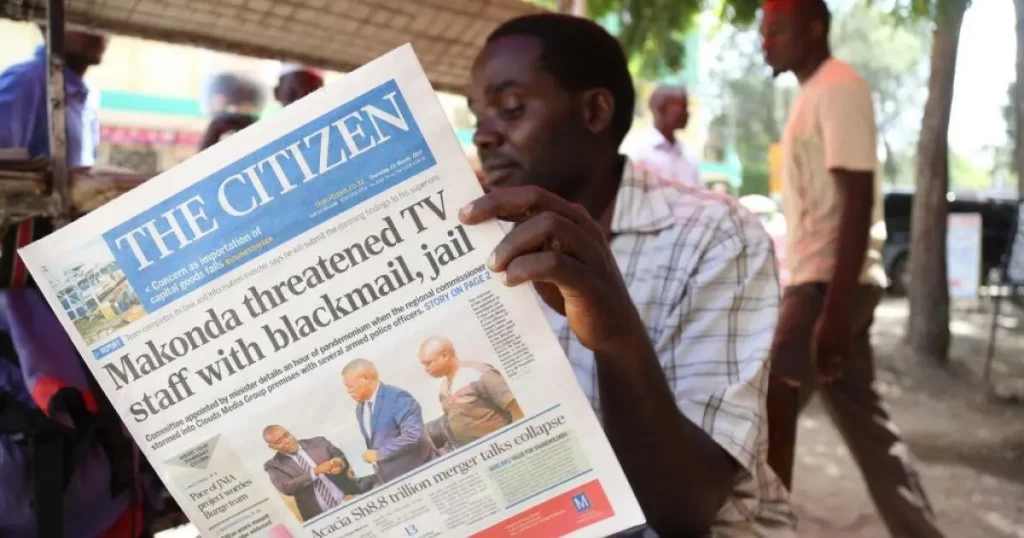In the author’s note of his number one best-seller novel, The Fourth Estate, Jeffrey Archer writes, “In May 1789, Louis XVI summoned a full meeting of the ‘Estates Generals’ to Versailles. The First Estate consisted of three hundred nobles. The second estate, three hundred clergy. The third estate, six hundred commoners. Some years later, after the French Revolution, Edmund Burke, looking up at the Press Gallery of the House of Commons, said, ‘Yonder sits the Fourth Estate, and they are more important than them all,”
Burke, the statesman and political thinker, coined the phrase Fourth Estate in 1821, where the church, nobility, and commoners comprised the first, second, and third estates to point out the power of the press and to stress journalists’ importance to politics.
Back home, our very own Justice Francis Nyalali aptly summarized the role of the press in Tanzania, “The mass media are to the body politic what the five senses are to the human body. It is through the mass media that a nation communes with itself and with other countries beyond.
In that way, the authorities within a nation, such as the legislature, executive, and judiciary, sense the problems and aspirations of the people they are established to serve. Conversely, it is through the same channel that the people feel the capacity and policies of those authorities.”
The role of freedom of the press in molding a just and democratic society and promoting political and socio–economic development cannot be emphasized. Still, it carries a responsibility to be the people’s watchdog.
Media in Tanzania: A Reflection on Its Evolving Role and Integrity
Looking at today’s media in Tanzania, one cannot but wonder to what extent the fourth estate in Tanzania is propelling and defending people’s justice and democracy. Does it fulfill the role of the five senses to the society they serve in the same way the senses do to our bodies? Whom does it help? Can it be trusted?
There may be a lot of expressions in response to these questions, as for me how I wish we could be back to the days our media was strapping, the days when our pen was sharp and strong, the good old days when through microphone we filled the atmosphere with solid airwaves from the voices of sons and daughters of Tanzania for the interest of Mama Tanzania.
The days when the public respected the pressmen and women as their only way to justice, those days when every concerned citizen before breaking fast with a cup of tea reading headlines of the day was a must. When irresponsible officials wouldn’t dare to come near the press, the time when tumbo street politicians wouldn’t dare confront the press with cheap publicity stunts and get away with it. Where are those days? Can someone out there tell me how and where the fourth estate in Nyerere’s land went wrong?
What does the dwindling of the newspaper stands and vendors in our major cities and towns suggest? The shrinking newspaper sales with some senior and experienced editors shunning newsrooms for other means of living sends what signal for the future of this noble professional?
One can easily attribute all these challenges to the emergence of the digitalized world, where anybody can easily access information from their handset. But what about the quality of our online content? Do they reflect real journalism? What can we say of this, has the development of communication digitalized even our thinking capacity?
Media’s Integrity: A Call for Reflection and Renewed Purpose
How can we comment on the agenda-setting role? According to Burke, we are supposed to be more important than the other three estates, are we still agenda-setters, or have we reduced ourselves to followers of others’ agenda? Isn’t ours a sacred professional that, according to Jesus, we are “… the salt of the earth (read public)? But how can the salt be made salty again if it loses saltiness? It is no longer good for anything except to be thrown out and trampled underfoot.”
What are our professional; contributions to issues and events in our nation? What value do we add? Is the public still counting on us for the way forward? Do we have answers to the troubling national issues? Are we helping the nation to find its true identity? Are we still serving the people’s interest, or are we just doing what interests the public now, and we pay little or no attention to the consequences?
Are we ready and willing to make a self-critical examination and forge a way to get things back as they used to be? Can we go Apostle Paul’s way when he told Corinth that he would rather glory in his infirmities that the power of Christ may rest upon him? When he is weak, he is strong, arguing further that his strength is perfect in weakness.
But the wisdom of God usually contradicts the wisdom of man. To be strong means to be able to do it all by yourself, without help, thats what Paul means, he cannot solve his weakness without divine assistance. What of us, can we break this conundrum without external assistance?
When Socrates coined the adage that he finally released that he was the wisest man in Athens, it resulted from the realization that he was the only one prepared to admit his ignorance rather than pretend to know something he did not.
Can we walk in Socrates’ footsteps, admit our weaknesses, and start healing? For them, we are half dead before we understand our disorder and half cured when we do. By the way, don’t even mind me; I am just an easygoing chap who goes even well with a glass of wine.
Read more promising insights by Deus Bugaywa.

